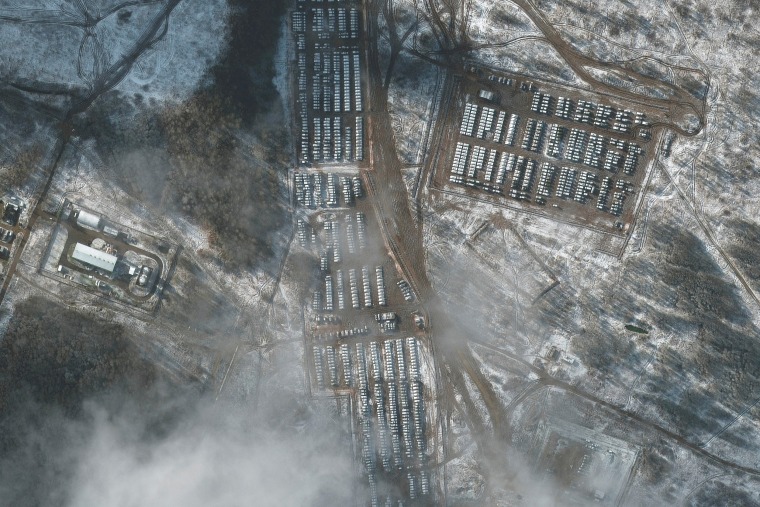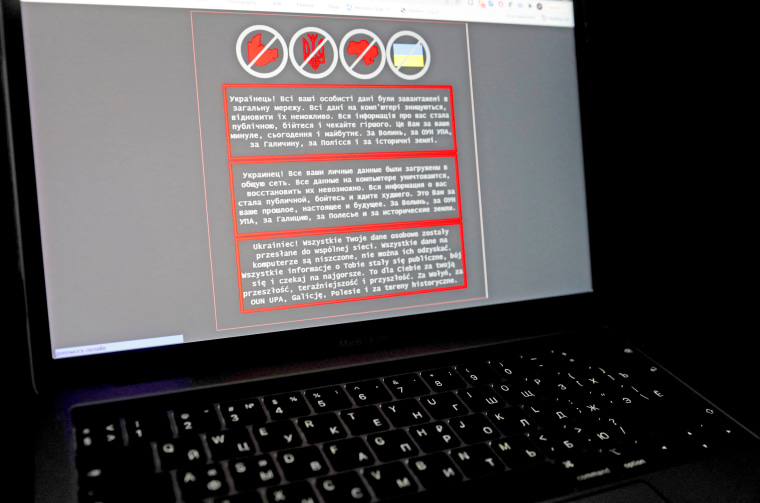Ukraine was hit by a massive cyberattack on Friday warning its citizens to “expect the worst,” and Russia, which has massed more than 100,000 troops on its neighbor’s frontier, released television pictures of more forces deploying in a drill.
The developments came after no breakthrough was reached at meetings between Russia and Western states, which fear Moscow could launch a new attack on the country it invaded in 2014.
“The drumbeat of war is sounding loud,” said a senior U.S. diplomat.
Russia denies plans to attack Ukraine but says it could take unspecified action unless demands are met, including a promise by the NATO alliance never to admit Kyiv.
Ukrainian authorities were investigating the huge cyberattack Friday, which hit government bodies including the ministry of foreign affairs, cabinet of ministers, and security and defense council.
“Ukrainian! All your personal data was uploaded to the public network. All data on the computer is destroyed, it is impossible to restore it,” said a message visible on hacked government websites, written in Ukrainian, Russian and Polish.
“All information about you has become public, be afraid and expect the worst. This is for your past, present and future.”
Ukraine’s foreign ministry spokesperson told Reuters it was too early to say who could be behind the attack but said Russia had been behind similar strikes in the past.
John Hultquist, head of intelligence for the cybersecurity firm Mandiant, told NBC News the attack was “consistent with incidents we’ve seen in the past as tensions have grown in region,” including mass defacements carried out against Georgian government sites. Georgian sites were defaced prior to a Russian invasion in 2008, and Russian intelligence defaced Georgia sites in 2019.
Said Hultquist, “This incident could be the work of government actors or government sponsored actors or it could have been done by elements of civil society reacting independently. Historically, most defacements have been low level hackers who sometimes leave patriotic messages on targets, but government sponsored actors have carried out this type of activity as well.”
Hultquist said “organizations need to begin preparing now” for more extensive cyber attacks in Ukraine and potentially elsewhere as tensions grow, including possible attacks against critical infrastructure.
Russia did not immediately comment but has previously denied being behind cyber attacks on Ukraine.
On Friday morning, Andriy Yermak, chief of staff to Ukrainian President Volodymyr Zelenskiy, said the cyber attack did not destroy the government’s “most strategic IT infrastructure” and that government websites were mostly up and running again.
“At this moment practically 90 percent of these sites have started to work,” Yermak said at online event organized by the Atlantic Council think tank in Washington.
The Ukrainian security services and intelligence agencies are investigating the attack and will share their findings, he said.
Ukrainian authorities were cooperating closely with U.S., British and other partners as well, Yermak said.
The attack was a possible attempt at “the potential destabilization of Ukraine,” he said, without mentioning Russia.
The European Union’s top diplomat condemned the attack and said the E.U.’s political and security committee and cyber units would meet to see how to respond and help Kyiv.
“We are going to mobilize all our resources to help Ukraine to tackle this cyber attack. Sadly, we knew it could happen,” Josep Borrell told reporters at a meeting in the western French city of Brest.

Meanwhile Russia said troops in its far east would practice deploying to far-away military sites for exercises as part of an inspection. Defense Ministry footage released by RIA news agency showed numerous armored vehicles and other military hardware being loaded onto trains in the Eastern Military District.
“This is likely cover for the units being moved towards Ukraine,” said Rob Lee, a military analyst and a fellow at the U.S.-based Foreign Policy Research Institute.
The movements indicated Russia has no intention of dialing down tensions over Ukraine, having used its troop build-up to force the West to the negotiating table and press sweeping demands for “security guarantees” — key elements of which have been described by the United States as non-starters.
Washington warned on Thursday that the threat of a Russian military invasion was high. Russia has consistently denied that.
Moscow said dialogue was continuing but was hitting a "dead end" as it tried to persuade the West to bar Ukraine from joining NATO and roll back decades of alliance expansion in Europe.
The United States and NATO have rejected those demands but said they are willing to talk about arms control, missile deployments, confidence-building measures and limits on military exercises.
Russian Foreign Minister Sergei Lavrov said on Friday that Moscow was awaiting a point-by-point written response to its proposals.

